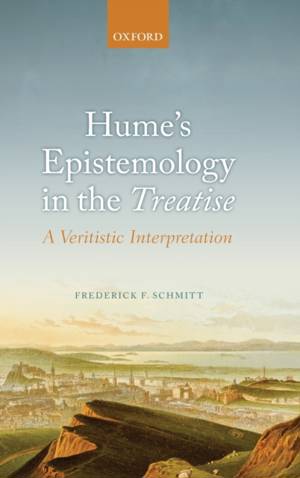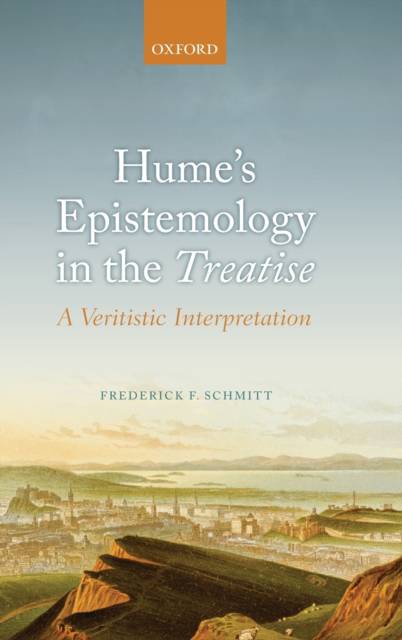
En raison d'une grêve chez bpost, votre commande pourrait être retardée. Vous avez besoin d’un livre rapidement ? Nos magasins vous accueillent à bras ouverts !
- Retrait gratuit dans votre magasin Club
- 7.000.000 titres dans notre catalogue
- Payer en toute sécurité
- Toujours un magasin près de chez vous
En raison de la grêve chez bpost, votre commande pourrait être retardée. Vous avez besoin d’un livre rapidement ? Nos magasins vous accueillent à bras ouverts !
- Retrait gratuit dans votre magasin Club
- 7.000.0000 titres dans notre catalogue
- Payer en toute sécurité
- Toujours un magasin près de chez vous
Hume's Epistemology in the Treatise
A Veritistic Interpretation
Frederick F Schmitt
Livre relié | Anglais
168,45 €
+ 336 points
Description
Frederick F. Schmitt offers a systematic interpretation of David Hume's epistemology, as it is presented in the indispensable A Treatise of Human Nature. Hume's text alternately manifests scepticism, empiricism, and naturalism in epistemology. Interpretations of his epistemology have tended to emphasise one of these apparently conflicting positions over the others. But Schmitt argues that the positions can be reconciled by tracing them to a single underlying epistemology of knowledge and probability quietly at work in the text, an epistemology according to which truth is the chief cognitive merit of a belief, and knowledge and probable belief are species of reliable belief. Hume adopts Locke's dichotomy between knowledge and probability and reassigns causal inference from its traditional place in knowledge to the domain of probability--his most significant departure from earlier accounts of cognition. This shift of causal inference to an associative and imaginative operation
raises doubts about the merit of causal inference, suggesting the counterintuitive consequence that causal inference is wholly inferior to knowledge-producing demonstration. To defend his associationist psychology of causal inference from this suggestion, Hume must favourably compare causal inference with demonstration in a manner compatible with associationism. He does this by finding an epistemic status shared by demonstrative knowledge and causally inferred beliefs--the status of justified belief. On the interpretation developed here, he identifies knowledge with infallible belief and justified belief with reliable belief, i.e., belief produced by truth-conducive belief-forming operations. Since infallibility implies reliable belief, knowledge implies justified belief. He then argues that causally inferred beliefs are reliable, so share this status with knowledge. Indeed Hume assumes that causally inferred beliefs enjoy this status in his very argument for associationism. On the
reliability interpretation, Hume's accounts of knowledge and justified belief are part of a broader veritistic epistemology making true belief the chief epistemic value and goal of science. The veritistic interpretation advanced here contrasts with interpretations on which the chief epistemic value of belief is its empirical adequacy, stability, or fulfilment of a natural function, as well as with the suggestion that the chief value of belief is its utility for common life. Veritistic interpretations are offered of the natural function of belief, the rules of causal inference, scepticism about body and matter, and the criteria of justification. As Schmitt shows, there is much attention to Hume's sources in Locke and to the complexities of his epistemic vocabulary.
raises doubts about the merit of causal inference, suggesting the counterintuitive consequence that causal inference is wholly inferior to knowledge-producing demonstration. To defend his associationist psychology of causal inference from this suggestion, Hume must favourably compare causal inference with demonstration in a manner compatible with associationism. He does this by finding an epistemic status shared by demonstrative knowledge and causally inferred beliefs--the status of justified belief. On the interpretation developed here, he identifies knowledge with infallible belief and justified belief with reliable belief, i.e., belief produced by truth-conducive belief-forming operations. Since infallibility implies reliable belief, knowledge implies justified belief. He then argues that causally inferred beliefs are reliable, so share this status with knowledge. Indeed Hume assumes that causally inferred beliefs enjoy this status in his very argument for associationism. On the
reliability interpretation, Hume's accounts of knowledge and justified belief are part of a broader veritistic epistemology making true belief the chief epistemic value and goal of science. The veritistic interpretation advanced here contrasts with interpretations on which the chief epistemic value of belief is its empirical adequacy, stability, or fulfilment of a natural function, as well as with the suggestion that the chief value of belief is its utility for common life. Veritistic interpretations are offered of the natural function of belief, the rules of causal inference, scepticism about body and matter, and the criteria of justification. As Schmitt shows, there is much attention to Hume's sources in Locke and to the complexities of his epistemic vocabulary.
Spécifications
Parties prenantes
- Auteur(s) :
- Editeur:
Contenu
- Nombre de pages :
- 448
- Langue:
- Anglais
Caractéristiques
- EAN:
- 9780199683116
- Date de parution :
- 26-01-14
- Format:
- Livre relié
- Format numérique:
- Ongenaaid / garenloos gebonden
- Dimensions :
- 236 mm x 165 mm
- Poids :
- 816 g

Les avis
Nous publions uniquement les avis qui respectent les conditions requises. Consultez nos conditions pour les avis.






